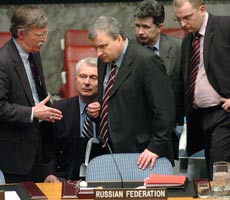
United States Permanent
Representative to the United Nations John Bolton (1st L) talks with his Russian
counterpart Andrey Denisov (3rd L) during a UN Security Council meeting on
Iran's nuclear issue at the UN headquarters in New York March 29, 2006. The UN
Security Council unanimously adopted a presidential statement March 29, calling
on Iran to resume suspension of all uranium enrichment-related activities within
30 days. -Xinhua
After three weeks of intense negotiations, the UN Security Council
unanimously adopted a presidential statement yesterday afternoon calling on Iran
to resume suspension of all uranium enrichment-related activities within 30
days.
The statement was passed after the five permanent council
members -- the United States, Britain, France, China and Russia --reached
agreement on the text earlier in the day ending three weeks of haggling over its
contents.
"The ball is now back in Iran's court," French Ambassador to the UN Jean-Marc
de la Sabliere told reporters after the council approved the statement.
In the statement, co-sponsored by the EU trio -- Britain, France and Germany,
the council noted "with serious concern" that the International Atomic Energy
Agency (IAEA) "is unable to conclude that there are no undeclared nuclear
materials or activities in Iran."
The council called upon Iran to take steps required by the IAEAto build
confidence in the exclusively peaceful purpose of its nuclear program and to
resolve outstanding questions.
It also "underlines ... the particular importance of re-establishing full and
sustained suspension of all enrichment-related and reprocessing activities,
including research and development, to be verified by the IAEA."
The council requests IAEA Director-General Mohamed Elbaradei to deliver in 30
days a new report to the IAEA board of governors and the Security Council on
Iran's compliance with IAEA demands, including the suspension of its enrichment
activities.
The EU troika originally set a fortnight timeframe for Iran to comply with
IAEA requirements, but it had to be extended due to strong opposition from
Russia.
During Wednesday's negotiations, they also agreed to drop the language which
would have vaguely linked Iran's nuclear program with a threat to international
peace and security, in a bid to get Russia on board.
The five key council members have been wrangling over how to respond to the
crisis over Iran's nuclear plan after the IAEA reported the matter to the
council in early March.
The United States claims that Iran's program is designed to develop nuclear
weapons. But Teheran insists that its nuclear program is aimed at generating
electricity and it is entitled to develop peaceful nuclear technology under the
nuclear Non-Proliferation Treaty.
On Thursday, foreign ministers of the five permanent council members and
their German colleague are due to meet in Berlin to discuss the international
community's future strategy toward Iran's nuclear issue.
A presidential statement needs consensus among the 15 council members while a
resolution requires a minimum of nine votes and no veto from any of the five
permanent members.



